
Oct 24
/
Pedro Schicchi
Grains, Oilseeds and Livestock Weekly Report - 2023 10 24
Back to main blog page
"Planting in Brazil is underway, reaching 29% completion with overall good progress, although there has been a slight slowdown attributed to dry weather, particularly in the Center-West region.
Argentina has also begun corn planting, but progress has been relatively slow due to delayed El Niño rains, prompting some farmers to consider planting soybeans or second-crop corn.
Soil moisture levels in key areas are below average in Brazil. However, since most crops are in the vegetative stage, and the critical reproductive phases occur later, this is not necessarily alarming.
While it's too early to claim it will have an impact on yields, the current dryness is a concern, with key crop development stages approaching in December and January in Brazil and in January and February in Argentina. The current weather patterns and soil conditions warrant close monitoring."
South American summer crop is starting. What are the early indicators?
An update on planting progress
Brazilian crop is starting, and planting this week has reached 29%. A slight slowdown in the last two weeks is noticeable. According to reports, this has been due to the dry weather, keeping farmers from maintaining the high pace seen in the first few weeks, particularly in the Center-West. Still, the pace has been pretty good so far, and levels are above the 5Y average.
Meanwhile, corn planting in Argentina has also started. The pace seen so far is relatively slow since the anticipated El Niño rains have not materialized yet. At least not in the needed volume and/or consistency. This is a factor that could push farmers to plant either soybeans or second-crop corn, to allow more time for the situation to improve.
Brazil Soybean – Planting (%)
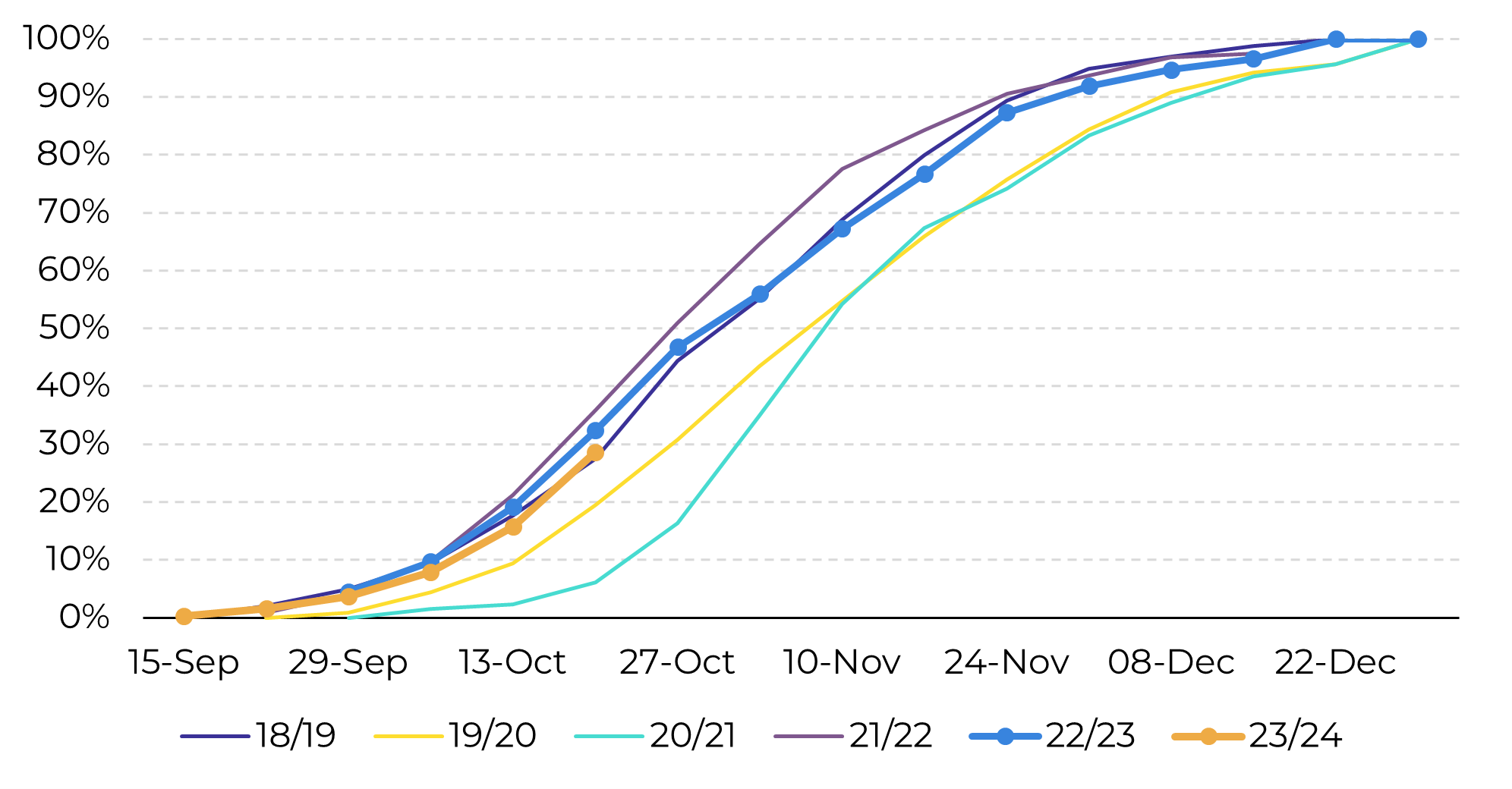
Source: Safras
Argentina Corn – Planting (%)
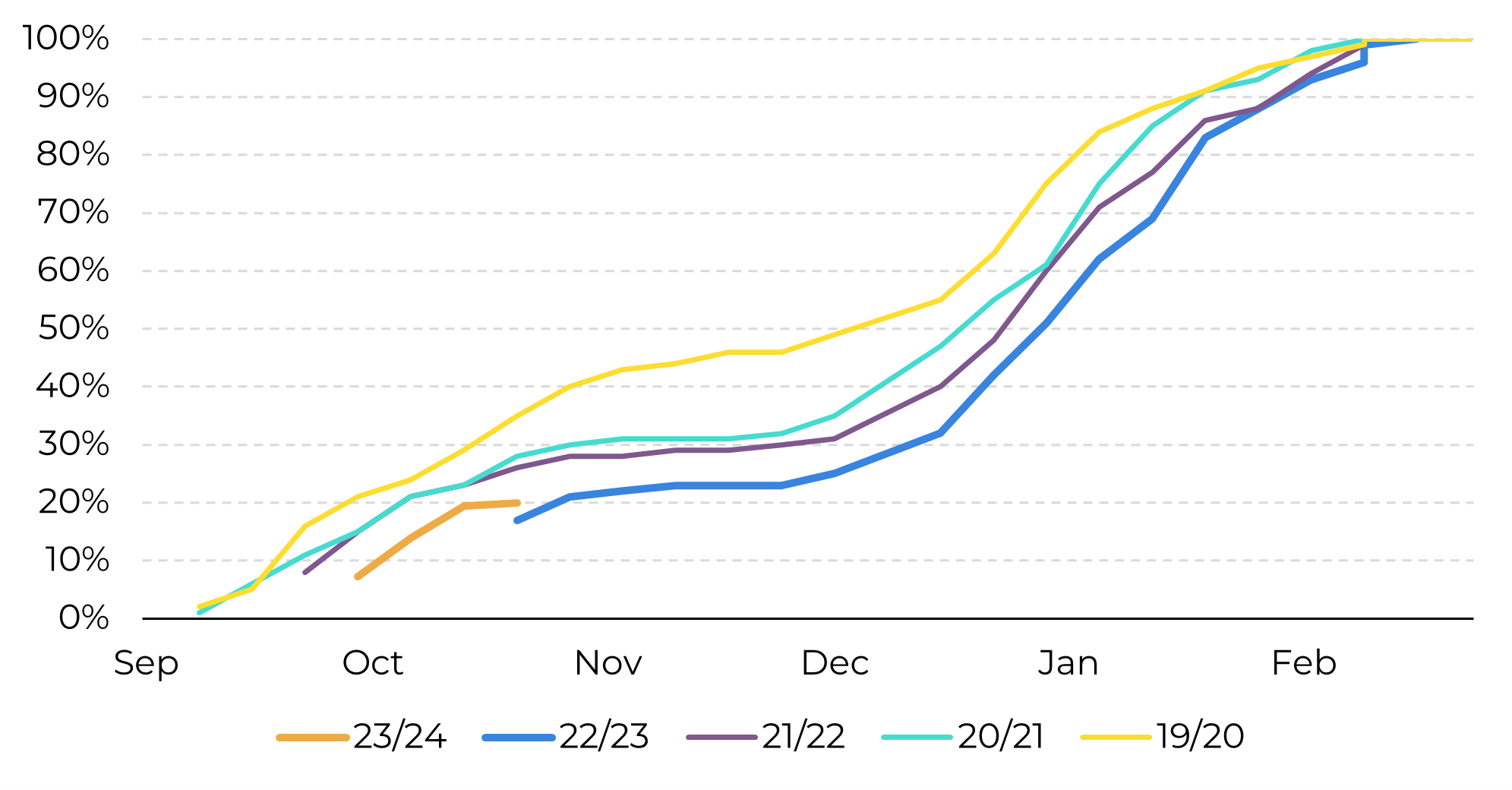
Source: Bolsa de Cereales
Soil moisture levels, while not in a critical state, are less than ideal
The maps below show where soil moisture conditions in selected cutoff dates rank among more than 50 years of history. We have current conditions, one month ago and one year ago.
One month ago, most of the Brazilian Center-West had higher-than-average soil moisture levels. Currently, levels in most areas are below average. Exceptions are Rio Grande do Sol and parts of Paraná.
Before sounding alarmist, it is important to note that below-average does not necessarily mean bad. Additionally, most planted areas, including those of summer corn, are in vegetative development.
The maps below show where soil moisture conditions in selected cutoff dates rank among more than 50 years of history. We have current conditions, one month ago and one year ago.
One month ago, most of the Brazilian Center-West had higher-than-average soil moisture levels. Currently, levels in most areas are below average. Exceptions are Rio Grande do Sol and parts of Paraná.
Before sounding alarmist, it is important to note that below-average does not necessarily mean bad. Additionally, most planted areas, including those of summer corn, are in vegetative development.
Rootzone soil moisture – Oct-22 (percentile)
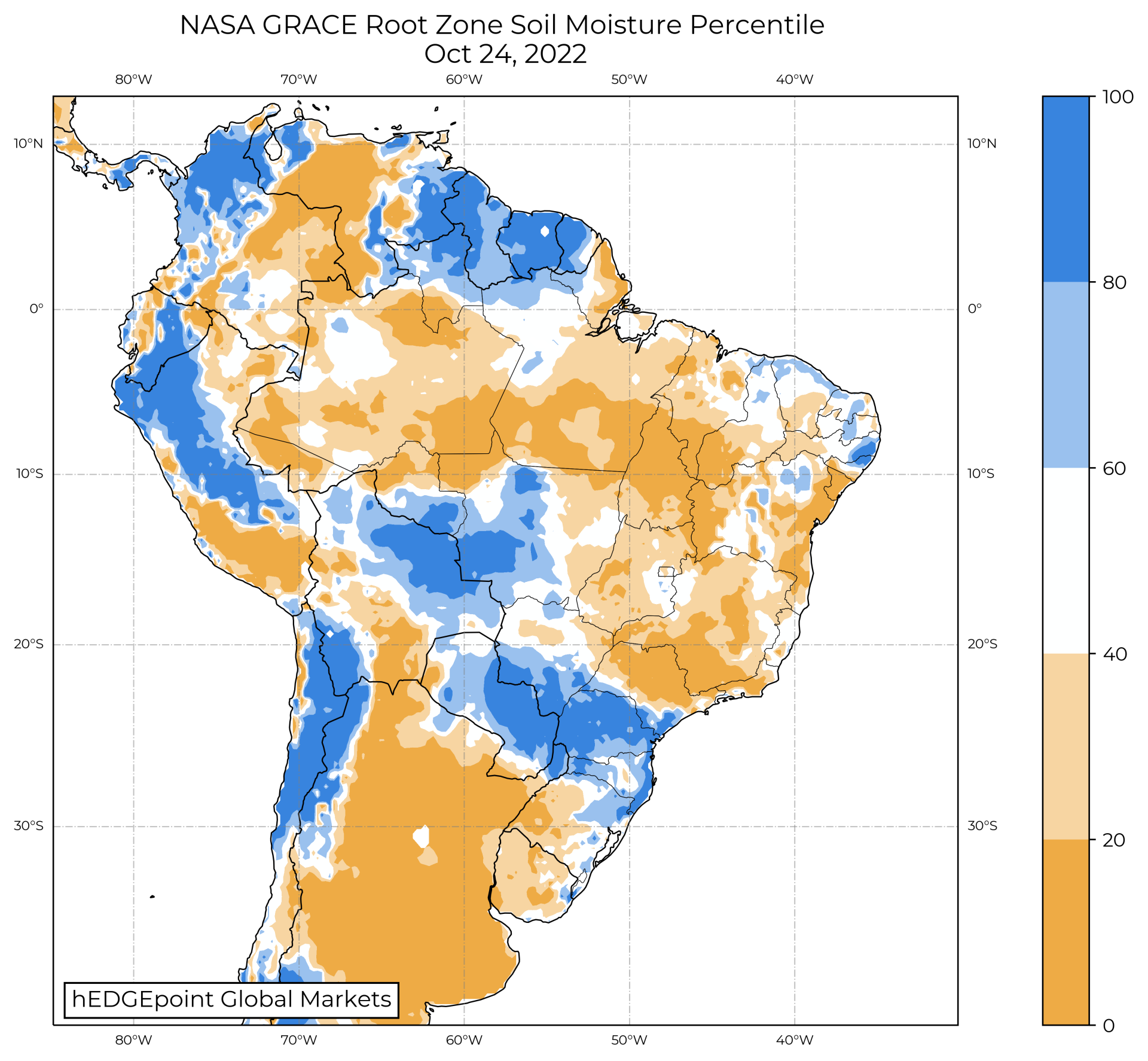
Source: hEDGEpoint, NASA
Rootzone soil moisture – Sep-22 (percentile)
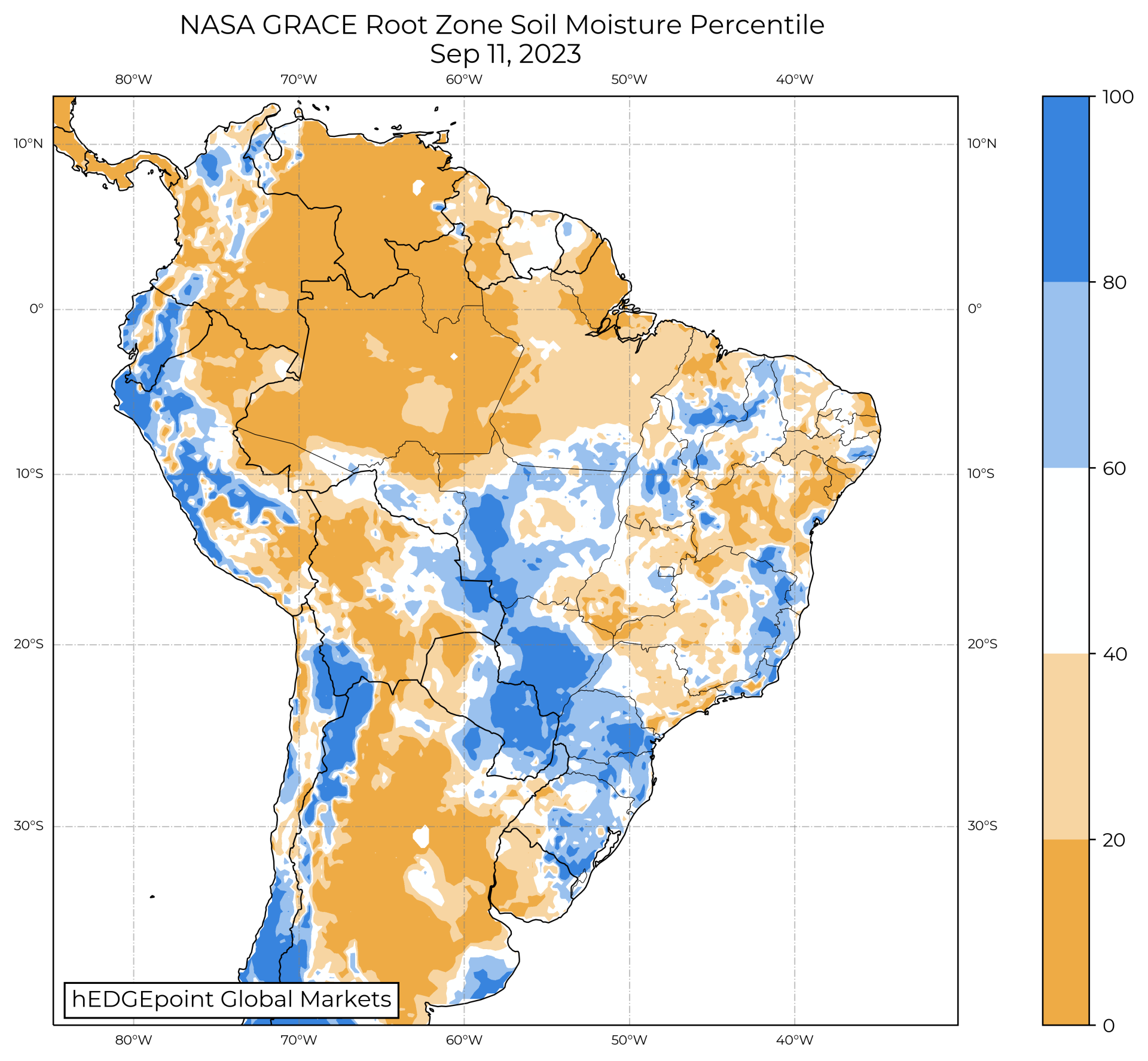
Source: hEDGEpoint, NASA
Rootzone soil moisture – Oct-23 (percentile)
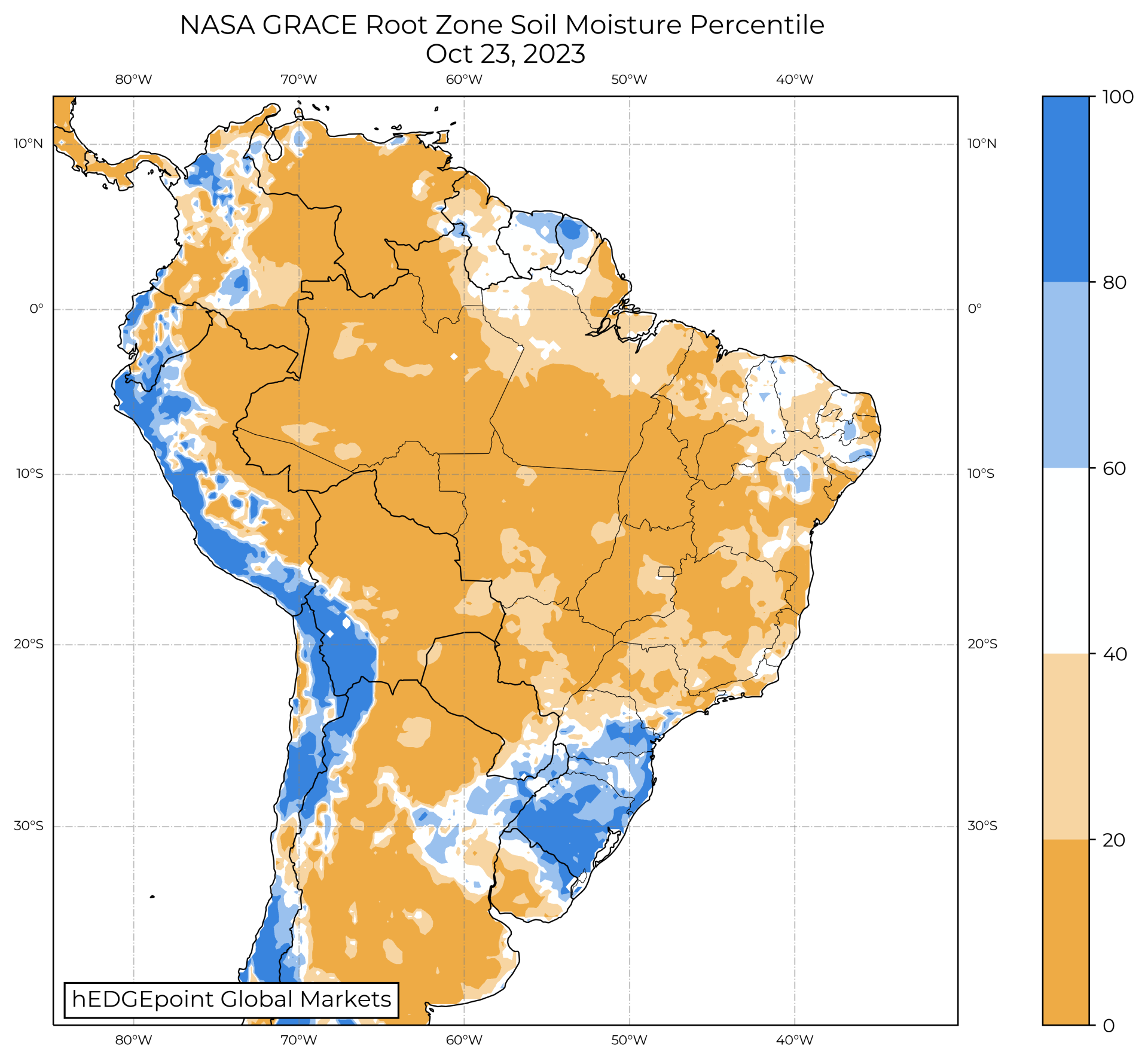
Source: hEDGEpoint, NASA
Short-term weather forecasts...
...show maintenance of the pattern that has predominated recently: rainier in the South of Brazil, but hotter and drier-than-normal in the Center North. When coupled with the current soil moisture levels, this is not exactly good news for the country.
In Argentina, close to average rainfall is forecasted, which is a more positive outlook – although not as widespread as one might expect during an active El Niño.
In any case, even if this is not determinant for yields at this point, things are not trending in a positive direction, and we must watch the next developments.
Precipitation Anomaly – Oct 24 to Nov 6 (in/day from normal)
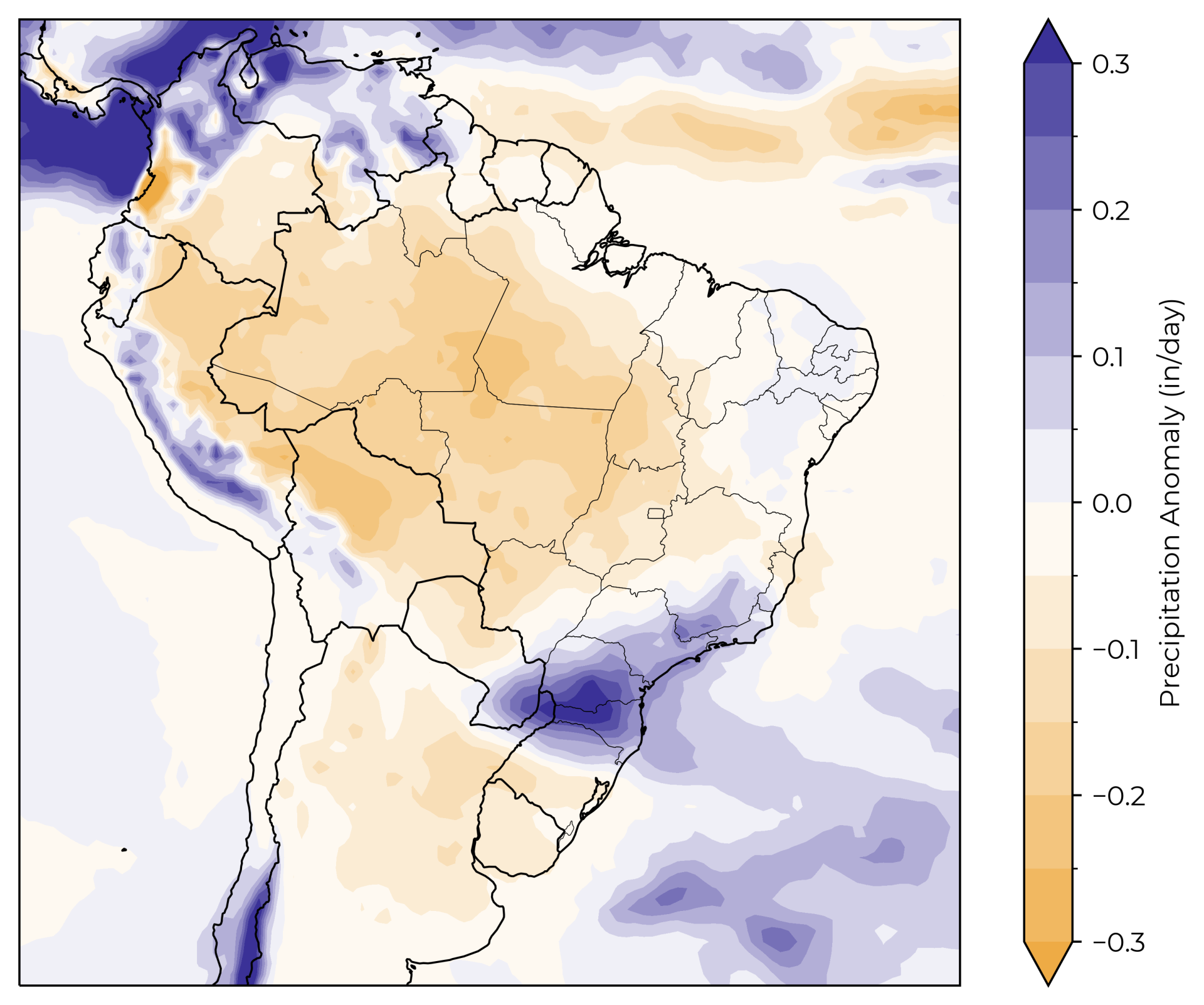
Source: hEDGEpoint, NOAA
Temperature Anomaly – Oct 24 to Nov 6 (°F from normal)
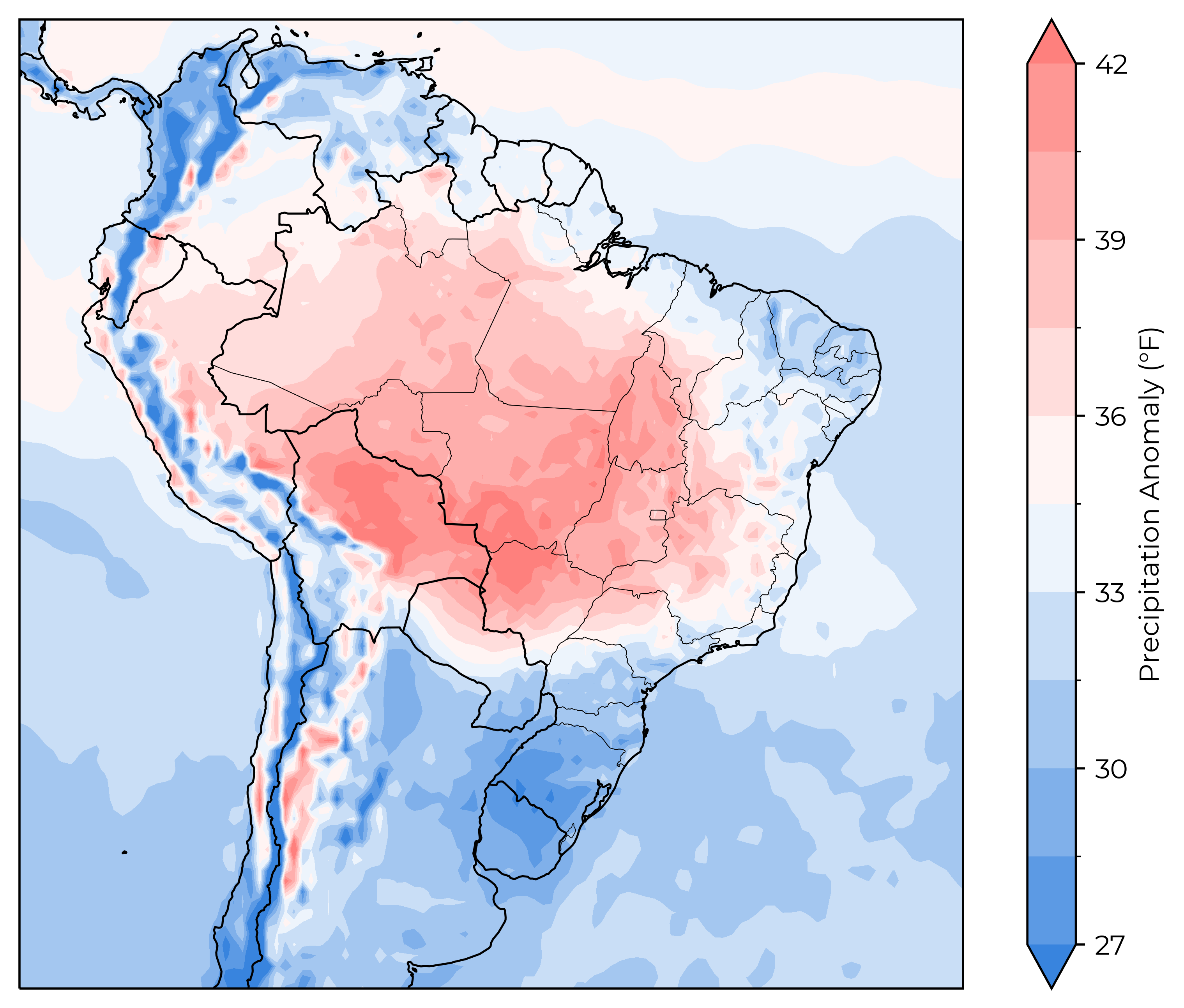
Source: hEDGEpoint, NOAA
Conclusions
Once again, it is early to make claims about how this recent dryness will affect yield. In the past, soybeans have often resisted harsh starts and yielded a good crop in the end. However, the trend we are seeing is not too good, and this is a scenario that we must watch closely as it unfolds.
Looking at the usual development in these two countries, the key stages will happen in Dec/Jan in Brazil and Jan/Feb in Argentina. The base case scenario is still of good crops in both countries, but if we keep seeing the same patterns as we move closer to these key windows, concerns should grow.
Weekly Report — Grains and Oilseeds
Written by Pedro Schicchi
pedro.schicchi@hedgepointglobal.com
pedro.schicchi@hedgepointglobal.com
Reviewed by Lívea Coda
livea.coda@hedgepointglobal.com
livea.coda@hedgepointglobal.com
www.hedgepointglobal.com
Disclaimer
This document has been prepared by hEDGEpoint Global Markets LLC and its affiliates ("HPGM") exclusively for informational and instructional purposes, without the purpose of creating obligations or commitments with third parties, and is not intended to promote an offer, or solicitation of an offer, to sell or buy any securities or investment products. HPGM and its associates expressly disclaim any use of the information contained herein that may result in direct or indirect damage of any kind. If you have any questions that are not resolved in the first instance of contact with the client (client.services@hedgepointglobal.com), please contact our internal ombudsman channel (ouvidoria@hedgepointglobal.com) or 0800-878-8408 (for clients in Brazil only).
Contact us
hedgepointhub.support@hedgepointglobal.com
ouvidoria@hedgepointglobal.com
Funchal Street, 418, 18º floor - Vila Olímpia São Paulo, SP, Brasil
Check our general terms and important notices.
This page has been prepared by Hedgepoint Schweiz AG and its affiliates (“Hedgepoint”) solely for informational and instructional purposes, without the purpose of instituting obligations or commitments to third parties, nor is it intended to promote an offer, or solicitation of an offer of sale or purchase relating to any securities, commodities interests or investment products. Hedgepoint and its associates expressly disclaim any use of the information contained herein that directly or indirectly result in damages or damages of any kind. Information is obtained from sources which we believe to be reliable, but we do not warrant or guarantee the timeliness or accuracy of this information. The trading of commodities interests such as futures, options, and swaps involves substantial risk of loss and may not be suitable for all investors. You should carefully consider wither such trading is suitable for you in light of your financial condition. Past performance is not necessarily indicative of future results. Customers should rely on their own independent judgement and/or advisors before entering in any transaction.Hedgepoint does not provide legal, tax or accounting advice and you are responsible for seeking any such advice separately.Hedgepoint Schweiz AG is organized, incorporated, and existing under the laws of Switzerland, is filiated to ARIF, the Association Romande des Intermédiaires Financiers, which is a FINMA-authorized Self-Regulatory Organization. Hedgepoint Commodities LLC is organized, incorporated, and existing under the laws of the USA, and is authorized and regulated by the Commodity Futures Trading Commission (CFTC) and a member of the National Futures Association (NFA) to act as an Introducing Broker and Commodity Trading Advisor. HedgePoint Global Markets Limited is Regulated by the Dubai Financial Services Authority. The content is directed at Professional Clients and not Retail Clients. Hedgepoint Global Markets PTE. Ltd is organized, incorporated, and existing under the laws of Singapore, exempted from obtaining a financial services license as per the Second Schedule of the Securities and Futures (Licensing and Conduct of Business) Act, by the Monetary Authority of Singapore (MAS). Hedgepoint Global Markets DTVM Ltda. is authorized and regulated in Brazil by the Central Bank of Brazil (BCB) and the Brazilian Securities Commission (CVM). Hedgepoint Serviços Ltda. is organized, incorporated, and existing under the laws of Brazil. Hedgepoint Global Markets S.A. is organized, incorporated, and existing under the laws of Uruguay. In case of questions not resolved by the first instance of customer contact (client.services@Hedgepointglobal.com), please contact internal ombudsman channel (ombudsman@hedgepointglobal.com – global or ouvidoria@hedgepointglobal.com – Brazil only) or call 0800-8788408 (Brazil only).Integrity, ethics, and transparency are values that guide our culture. To further strengthen our practices, Hedgepoint has a whistleblower channel for employees and third-parties by e-mail ethicline@hedgepointglobal.com or forms Ethic Line – Hedgepoint Global Markets.Security note: All contacts with customers and partners are conducted exclusively through our domain @hedgepointglobal.com. Do not accept any information, bills, statements or requests from different domains and pay special attention to any variations in letters or spelling, as they may indicate a fraudulent situation.“HedgePoint” and the “HedgePoint” logo are marks for the exclusive use of HedgePoint and/or its affiliates. Use or reproduction is prohibited, unless expressly authorized by HedgePoint. Furthermore, the use of any other marks in this document has been authorized for identification purposes only. It does not, therefore, imply any rights of HedgePoint in these marks or imply endorsement, association or seal by the owners of these marks with HedgePoint or its affiliates.
We have updated our Terms & Conditions to reflect improvements to our platform, data handling practices, and the overall experience we provide to our clients.
To continue using the Hedgepoint HUB, please review and accept the updated terms.

